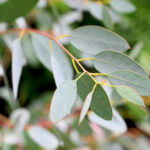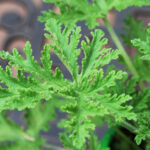It’s summer in the South. The days are sunny and hot. Flowers and trees are in full bloom. Picnics and barbecues are on the calendar. Some people don’t know this, but all of these things are also appealing to wasps and bees. Want to keep bees and wasps away without using a bug spray that makes you sick? Keep reading to learn three natural ways to keep bees and wasps away.
Does Citronella Repel Bees?
Citronella is a natural oil that comes from a plant belonging to the Geraniaceae family. It has a strong, lemon-like scent and is commonly used as an insect repellent, especially against mosquitoes. But does citronella also help repel bees?
The answer is yes, citronella oil can be effective at repelling bees to some extent when used properly. Here’s a closer look at how citronella affects bees and how you can use it to keep bees away.
How Citronella Repels Bees
Bees, like many insects, rely heavily on their sense of smell to gather information about their environment. They particularly dislike strong, pungent odors that overwhelm their scent receptors.
The intense lemony aroma of citronella oil irritates a bee’s olfactory system. Bees find the smell offensive and will tend to avoid areas where citronella has been applied.
However, citronella oil does not affect bees in the same potent way that it drives off mosquitoes. It may deter bees from lingering in a particular spot, but it does not keep them away completely or permanently.
Methods of Using Citronella Against Bees
Here are some of the most common ways that citronella can be used to repel bees:
-
Citronella candles – When citronella candles are lit, the fumes released into the air can help keep bees at bay. Position the candles near beehives or other areas where bees are problematic.
-
Citronella incense sticks – Incense sticks made from citronella oil also give off an aroma that bees dislike when burned. Use them on patios, decks, or picnic areas to deter bees.
-
Citronella essential oil – You can apply pure citronella essential oil directly onto surfaces or mix it with water in a spray bottle. Mist areas around your home where bees are spotted. Avoid spraying the oil directly on the bees.
-
Citronella plants – Potted citronella plants release their scent naturally into the air, which may drive bees away from your yard. Citronella thrives best in warm, sunny spots.
Limitations of Citronella with Bees
While citronella can be a bee deterrent, there are some limitations to consider:
-
It may only repel bees located very close to the citronella source. Its effects do not extend over a wide radius.
-
Bees can become used to the smell of citronella over time. Its repelling strength will diminish if used excessively in the same location.
-
Citronella is not potent enough to permanently drive bees away from an area. Once the citronella scent disperses, bees will likely return.
-
Direct contact with concentrated citronella oil can be toxic and even fatal to bees. It should always be diluted and never sprayed directly onto bee populations.
The Bottom Line
Citronella can be a useful tool in your effort to reduce bees around your property. Its strong, unpleasant odor drives bees away temporarily from the immediate area. However, citronella oil is not a standalone solution for ridding bees permanently. It needs to be used carefully and alongside other bee prevention methods for the best control. Test it out cautiously first and monitor how bees in your yard respond before relying on it heavily.
Plants That Repel Bees and Wasps
Bees and wasps are repelled by the following plants, most of which have strong herb or mint smells:
If you don’t mind the strong smells, you might want to put some of these near the outdoor areas of your home that you use often to keep bees and other stinging insects away.





Plants That Attract Bees and Wasps
Bees and wasps are pollinators, so they like flowering plants. However, there are some flowers they’re particularly drawn to, including:
- Black-eyed Susan
- Honeysuckle
- Lantana
- Lilacs
- Perennial Yarrow
- Poppies
- Pale Purple Coneflower
- Sweet Fennel
- Wisteria
- Queen Anne’s Lace
- Sedum
- Snapdragon
- Sunflowers
If any of these flowers are growing near your house, especially near a deck, porch, patio, or other outdoor area, you might want to move them if you can. Also, learning more about where wasps like to nest can help you plan your garden so that it doesn’t attract wasps. See our guide on where wasps nest for more information on common places for them to lay their eggs and how to keep them under control.
Does citronella repel bees?
FAQ
Does citronella keep bees away?
What smell do bees hate the most?
What insects are repelled by citronella?
Does citronella repel yellow jackets?
Does citronella repel mosquitoes?
The citronella plant’s citrus-like scent can repel mosquitoes, but only when the scent is released. This occurs when the leaves are crushed or citronella oil-based products are used. The scent that mosquitoes hate is not naturally emitted by the plant.
Does citronella repel bees?
Citronella is effective in repelling bees. Using citronella to repel bees is not only effective but keeps the bees safe. You can use a citronella candle, which not only emits the scent as a repellent but also produces smoke that dazes and confuses bees, causing them to stay away.
Does citronella repel bumblebees?
Citrus citronella smell is not as effective on sweat bees and might take longer to repel them alone. Instead, mint is what makes them go away instantly. You can mix citronella oil with mint oil for more efficacy. What bumblebees truly dislike, other than the smell of lime, lavender, or olive oil, is the smell of citronella.
What is the best insect repellent for bees?
Let’s explore some of the most effective substances for repelling bees. Citronella is one of the most effective natural bee repellents. Many insect repellent products contain citronella in the form of sprays and candles. Citronella oil repels insects rather than killing them.
Do citronella candles protect against bees?
Consider using citronella candles or diffusers in outdoor spaces to create a more extensive area of protection against bees. Be mindful of the wind direction when using citronella candles or diffusers, as it can impact the dispersion of the scent.
Does cinnamon repel bees?
While cinnamon adds warmth and richness to culinary delights, bees are not fans of its spicy aroma. Sprinkling cinnamon powder or using cinnamon-scented oils can deter bees from certain areas. Smell #5: Vinegar The sharp and acidic smell of vinegar is a powerful bee repellent.
